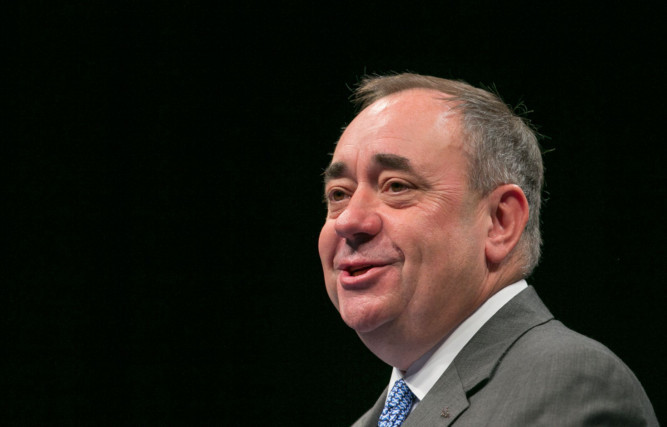
Alex Salmond is being lined up for a job on the secretive committee which oversees Britain’s spies as part of the SNP’s unprecedented new influence at Westminster.
The SNP will be entitled to a place on all of the Commons’ influential select committees following its General Election landslide north of the Border. This includes a berth on the Intelligence and Security Committee, previously chaired by Tory Sir Malcolm Rifkind.
Committee members are by convention also Privy Councillors and Salmond is the only member of the prestigious body of advisers to the Queen in the SNP’s ranks. The former party figurehead has already ruled himself out of other top jobs, including SNP Westminster leader and chief whip.
The move is a sign of the influence the 56 Nationalist MPs can now wield in the Commons, with the party also guaranteed two questions at Prime Minister’s Questions every week.
It is thought the SNP will also have a member as chairperson of a select committee, tipped to be energy. As well as the influence that goes with a large group at Westminster, party bosses will bank more than £1 million a year to spend on staff and research.
The money used to go to Labour’s Scottish MPs.
One SNP insider said: “The Intelligence and Security Committee is a really interesting one. It just shows how things are going to be very different down there.”
David Cameron could block Salmond joining the spooks committee, but he could struggle to find a good reason to blackball him since the former First Minister will have been privy to some state secrets in his previous role running Scotland.
Scottish Questions and the Scottish Affairs Committee could also be shaken up.
Under existing rules the Scottish Questions would see the new Scottish Secretary likely to be the only Scottish Conservative MP David Mundell quizzed by his shadow inevitably Labour’s only Scottish MP Ian Murray.
Commons insiders also point out the make-up of the Scottish Affairs Committee should reflect that of the House of Commons but that would mean a majority of its members would be Tories representing English seats.
The SNP will be allowed a seat on every select committee but there’s likely to be horse trading as they give up seats on reserved issues such as education in return for more representation on defence and business.
The party will be called third in all debates and can no longer have a time limit applied to speeches like smaller parties can.
Angus Robertson is expected to be confirmed as SNP Westminster leader this week and will be guaranteed the right to two questions at Prime Minister’s Questions.
Meanwhile, Mr Salmond has suggested the Tory majority might not last long once the new parliament is under way.
In a TV interview, the former SNP leader said: “I remember another Tory Prime Minister with a much bigger vote and bigger percentage, John Major. His government ran into the sands after about six months.
“David Cameron’s mandate looks a lot shakier than John Major’s and has a much lower percentage. So a Cameron government won’t have too long before it goes the same way as John Major.”
Salmond was speaking as the SNP’s new MPs gathered for the first time after the election. The new MPs will this week start preparing for life in Westminster, which reconvenes the following week, and hiring dozens of new staff needed for the role.
First Minister Nicola Sturgeon said she was “bursting with pride” as she addressed them. She added: “People voted for an SNP manifesto that had ending austerity as its number one priority. That is the priority these men and women will now take to the very heart of the Westminster agenda.
“It cannot and will not be business as usual when it comes to Westminster’s dealing with Scotland. Scotland’s voice will be heard in Westminster now more loudly than it has ever been before.”
She later added: “David Cameron said his priorities will be implementing the powers in the Smith Commission in good faith and I said to him that those proposals had to be looked at again because they are not strong enough.
“These are conversations we will go in to in more detail in the weeks and months to come.”
Deputy SNP leader Stewart Hosie said a deal on more powers will take years to be delivered but the talks should get under way now.
He said: “What needs to happen is the UK Government needs to think about what it is going to do. It is all of income tax, it is all of the large chunks of welfare, rather than bits and pieces which don’t make sense on their own. We have been clear on the powers Scotland needs.”
Related stories
Jim Murphy feeling the pressure as Labour MSPs and unions call on him to quit
Sunday Post Opinion: The people have spoken – Westminster must deliver

Enjoy the convenience of having The Sunday Post delivered as a digital ePaper straight to your smartphone, tablet or computer.
Subscribe for only £5.49 a month and enjoy all the benefits of the printed paper as a digital replica.
Subscribe